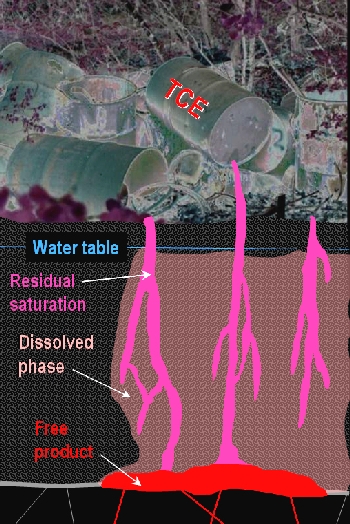
Publisher:
Bonnie King
CONTACT:
Newsroom@Salem-news.com
Advertising:
Adsales@Salem-news.com

~Truth~
~Justice~
~Peace~
TJP
Feb-01-2010 12:37

 TweetFollow @OregonNews
TweetFollow @OregonNews
Latest Study Says TCE Worse Than Thought
By Daniel DeBolt Mountain View Voice Special to Salem-News.comConclusions could lead EPA to propose tougher regulations.
 Courtesy: serc.carleton.edu |
(MOUNTAIN VIEW, Calif.) - This article is re-published with permission from the Mountain View Voice in California.
The Environmental Protection Agency has released a new report concluding that TCE — trichloroethylene, a pollutant found in much of Mountain View's groundwater — is definitely a carcinogen, a finding which could lead the agency to propose tougher cleanup standards.
"Many people across the country are exposed to TCE in their air and their water under current standards that would not be allowable under these (potential) new standards," explained Lenny Siegel, director of the Center for Public Environmental Oversight, a Mountain View-based nonprofit that helps in cleanup efforts at Superfund sites around the country.
But EPA toxicologist Dan Stralka noted that the report only makes conclusions on TCE's toxicity, and that no new standards have been proposed yet.
The report in question is a "toxicological review" released in December by the EPA, marking the most voluminous study to date of the human health effects of TCE, a solvent left behind by early Silicon Valley electronic manufacturers.
Siegel points out that the report concludes, on page 995, that "TCE is carcinogenic to humans by all routes of exposure" without qualifying that with "probably" or "highly likely." Human health effects include kidney and liver cancer, lymphoma and various other reproductive, developmental and neurological effects, Stralka said in a presentation to the Moffett Field Restoration Advisory Board on Jan. 14.
For years now, the presence of trichloroethylene in the soil and groundwater has spurred Superfund cleanup efforts at Moffett Field and in a part of northeastern Mountain View called "the MEW" (an area bordered by Middlefield, Ellis and Whisman roads), among various other sites scattered around Mountain View and Silicon Valley.
EPA project manager Alana Lee acknowledged that the size and scope of those cleanup areas could widen if the EPA proposes lowering drinking water standards for TCE. Current maps are drawn according to the 5 parts per billion standard, although Mountain View residents get their drinking water from the Hetch Hetchy water system, rather than local water tables.
The recent EPA report does not explicitly propose new standards for drinking water. But it does propose new standards for indoor air levels of TCE vapors, expressed in ranges which allow environmental advocates to call for heightened cleanup efforts. For residential areas, indoor air standards could go from 1 microgram per cubic meter to a range between 0.24 and 0.96 micrograms per cubic meter. Standards for business could go from 5 micrograms per cubic meter to a range between 2.5 and 9.8 micrograms per cubic meter. The difference between the standards for homes and businesses is partly due to the effects TCE has on children, Stralka said.
The new standards are similar to those created by the EPA and abandoned by the Bush administration in 2001. Siegel said he had not done an analysis of whether any homes or businesses in Mountain View could be called unsafe if cleanup standards changed as proposed. The cost of new mitigations on indoor air pollution would likely fall on the polluter for "existing" buildings, he said.
The vapors can emanate from groundwater as deep as 25 feet underground and into buildings that lack slab foundations or vapor intrusion membranes.
Siegel believes that the toxicology review of TCE was quietly worked on under the Bush administration, but political pressures kept it from being released. He says EPA scientists were told they would lose their jobs if they pushed for increased cleanup standards, which are a financial burden to polluters, including the U.S. military.
There is reportedly an effort by NASA and Office of Management and Budget officials to delay the new standards by sending the toxicology review to the National Academy of Sciences. Meanwhile, EPA administrator Lisa Jackson has received a letter opposing any further delays and signed by 29 people representing communities exposed to TCE across the country including Mountain View resident Jane Horton, whose Whisman Road home was found to have unsafe levels of TCE.
"As the Government Accountability Office has repeatedly pointed out, delays 'can result in substantial harm to human health, safety and the environment,'" the letter states. "That is, we don't want our families and our communities to be guinea pigs in permanent research experiment."
The TCE toxicology review and other updates on the subject can be found on the EPA's Web site here. Public comments on the recent review are due by Feb. 1.
(Editor's note: Special thanks to Mountain View Voice and reporter Daniel DeBolt's time and effort in generating this story. Salem-News.com has published numerous reports about the TCE (trichloroethylene) contamination of the El Toro Marine Corps Air Station in California and Camp Lejeune, an active military reservation in North Carolina. To learn more about TCE, visit: this Salem-News.com link to learn more.)
 |
 |
 |
Articles for January 31, 2010 | Articles for February 1, 2010 | Articles for February 2, 2010




googlec507860f6901db00.html
Quick Links
DINING
Willamette UniversityGoudy Commons Cafe
Dine on the Queen
Willamette Queen Sternwheeler
MUST SEE SALEM
Oregon Capitol ToursCapitol History Gateway
Willamette River Ride
Willamette Queen Sternwheeler
Historic Home Tours:
Deepwood Museum
The Bush House
Gaiety Hollow Garden
AUCTIONS - APPRAISALS
Auction Masters & AppraisalsCONSTRUCTION SERVICES
Roofing and ContractingSheridan, Ore.
ONLINE SHOPPING
Special Occasion DressesAdvertise with Salem-News
Contact:AdSales@Salem-News.com
Terms of Service | Privacy Policy
All comments and messages are approved by people and self promotional links or unacceptable comments are denied.
[Return to Top]
©2026 Salem-News.com. All opinions expressed in this article are those of the author and do not necessarily reflect those of Salem-News.com.